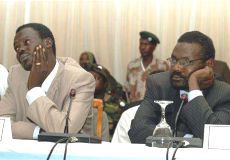Darfur rebels divided over proposed 60-day truce
Jan 15, 2007 (KHARTOUM) — A proposed ceasefire between Darfur rebels and the Sudanese government has exposed cracks in the fragile military alliance between insurgents in Sudan’s west, highlighting the long road ahead for peace talks.
 The ceasefire was negotiated by U.S. governor of New Mexico Bill Richardson in a visit last week and the 60-day truce was to begin on a date fixed by the African Union and the United Nations jointly which are mediating peace efforts.
The ceasefire was negotiated by U.S. governor of New Mexico Bill Richardson in a visit last week and the 60-day truce was to begin on a date fixed by the African Union and the United Nations jointly which are mediating peace efforts.
Richardson said he had met Darfur rebel leaders who had agreed to the ceasefire. Many Darfur rebel commanders who rejected a May peace deal with the government formed a new alliance called the National Redemption Front (NRF) and renewed hostilities with the government in June.
On Monday Jar el-Neby, a commander from a faction of the NRF called the G-19 which rejoint SLM-Abdelwahid al-Nur, said he would abide by the truce.
“We do agree with the truce,” he said. “Others in the NRF say they don’t agree, but we do agree to it.”
But leaders from another NRF faction, the Justice and Equality Movement (JEM) said there was no ceasefire.
“This declaration of ceasefire is unilateral by the government. There is no coordination with JEM at all,” JEM leader Khalil Ibrahim told Reuters from Darfur on Monday.
Other commanders from the NRF also said they would not abide by the truce.
The divisions show the fragile NRF alliance is a military convenience, analysts said, but politically the groups have very different views, a major obstacle to the previous peace talks and one likely to dog any new negotiations.
Rape, pillage and murder has killed an estimated 200,000 and driven around 2.5 million from their homes in four years of violence called genocide by Washington. Khartoum denies genocide. The International Criminal Court is investigating alleged war crimes in the region.
Ibrahim said he wanted a political agreement first, saying a ceasefire had strengthened the government’s position in previous rounds of talks which led to the unpopular May deal, signed by only one of three negotiating rebel factions.
Since then, the rebel factions have splintered into more than a dozen groups.
He also urged African leaders not to allow President Omar Hassan al-Bashir to become chairman of the pan-African body at a summit in January.
Diplomatic wranglings over Sudan’s chairmanship of the AU overshadowed the AU summit a year ago in Khartoum, with a compromise reached that Sudan would take the position at the January 2007 summit.
Sudan’s state media this week said Khartoum was preparing to take over the chair. But Ibrahim said if that happened there was no way the AU could mediate talks or keep its around 7,000 struggling peacekeepers in Darfur.
“Then we terminate our relations with the AU,” said Ibrahim. “The AU would become part of the problem of Darfur.”
(Reuters)
